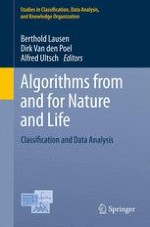2013 | OriginalPaper | Buchkapitel
Solving the Minimum Sum of L1 Distances Clustering Problem by Hyperbolic Smoothing and Partition into Boundary and Gravitational Regions
verfasst von : Adilson Elias Xavier, Vinicius Layter Xavier, Sergio B. Villas-Boas
Erschienen in: Algorithms from and for Nature and Life
Aktivieren Sie unsere intelligente Suche, um passende Fachinhalte oder Patente zu finden.
Wählen Sie Textabschnitte aus um mit Künstlicher Intelligenz passenden Patente zu finden. powered by
Markieren Sie Textabschnitte, um KI-gestützt weitere passende Inhalte zu finden. powered by
